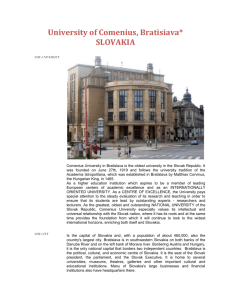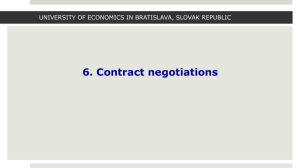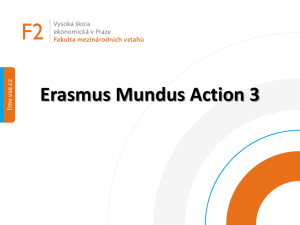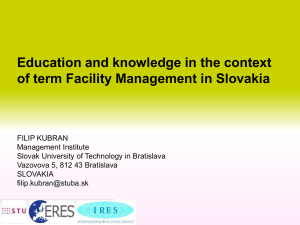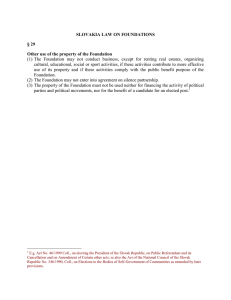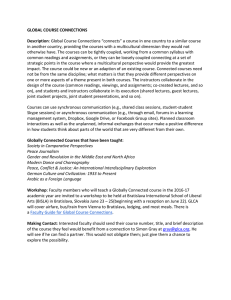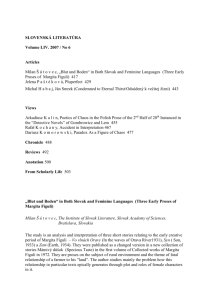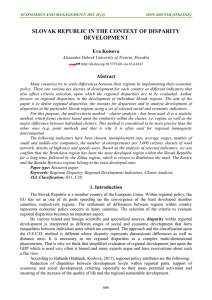Institutions
advertisement
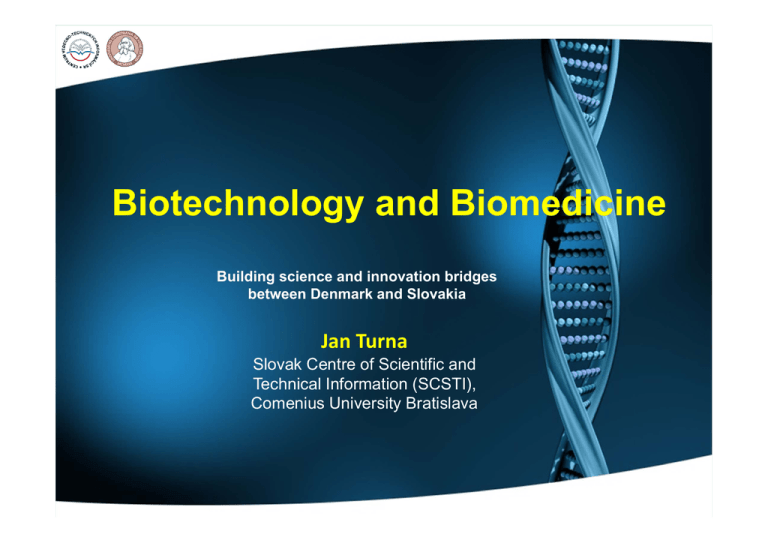
Biotechnology and Biomedicine Building science and innovation bridges between Denmark and Slovakia Jan Turna Slovak Centre of Scientific and Technical Information (SCSTI), Comenius University Bratislava Life Sciences in Slovakia • • • • • Structure and geographical distribution Institutions Education Infrastructure Future development Life Science Structure Infrastructure organization of the Life Sciences is very asymmetrical Martin Košice Nitra Bratislava • • Up to 70% is concentrated to Bratislava, 25% to Košice and Nitra, with the remaining 5% for the rest of the country. The most of the Life sciences capacity is held in the Slovak Academy of Sciences, less at the universities and agricultural research institutions, but only a very small part in private bussiness. Research capacities in SK Estimation: 1. 2. 3. 4. 5. 6. BIO (Biomedicine and Biotechnology) ICT (Information and commun. technology) MAT (Material research, nanotechnology) TECH (Industrial technology) ENERG (Sustainable energetics and energy) ENVIR (Environment, Agriculture) ca. 2200 publ. ca. 3750 publ. BIOMED – new diagnostics and therapeutical procedures in oncological cardiovascular, neurological diseases, endocrine and metabolic disorders, infection diseases and alergies. BIOTECH – mainly pharma and industrial biotech. More than 25% of all Slovak publications in international scientific journals comes from BIO Institutions: Universities Comenius University in Bratislava (Faculty on Natural Sciences, Faculty of Medicine, Jessenius Faculty of Medicine in Martin, Faculty of Pharmacy) P. J. Šafárik University in Košice (Faculty on Natural Sciences, Faculty of Medicine) Slovak University of Technology in Bratislava (Faculty of Chemical and Food Technology) University of Agriculture in Nitra University of Constantine Philosofer in Nitra University of SS. Cyril and Methodius in Trnava Institutions: Universities Comenius University in Bratislava Faculty on Natural Sciences, • • • • • • Dept. of Molecular Biology Dept. of Biochemistry Dept. of Microbiology and Virology Dept. of Genetics Dept. of Animal Physiology Dept. of Plant Physiology In 2006, Scientific council of Comenius Univ established “Center of excellence for biotech and biomedicine” (CEBBUK) Faculty of Medicine, Jessenius Faculty of Medicine in Martin Faculty of Pharmacy Faculty Matematics, Physics and Informatics Institutions: Slovak Academy of Sciences • Institute of Molecular Biology (Dr. Kormanec group) • Institute of Virology (Prof. Pastoreková group) • Cancer Research Institute (Dr. Sedlák group) • Institute of Mol. Physiol. and Genetics (Prof. Kádaši and Dr. Križanová groups) • Institute of Neuroimunology (Prof. Novák) Center for Molecular Medicine Institute of Exp. Endocrinology Institute of Chemistry Institute of Exp. Pharmacology Institute of Neurobiology in Košice Institute of Normal and Pathological Physiology Institute for Heart Research Institutions: Slovak Academy of Sciences Agricultural and Veterinary Sciences Institutes: • • • • • • • Institute of Zoology Institute of Botany Institute of Animal Biochemistry and Genetics Parasitological institute in Košice Institute of Animal Physiology in Košice Institute of Forest Ecology in Zvolen Institute of Landscape Ecology Institutions: Ministry of Agriculture Research Institutes National Agricultural and Food Research Centre: • • • • Research Institute for Animal Production in Nitra Food Research Institute in Bratislava Research Institute of Veterinary Medicine in Košice Research Institute of Plant Production in Piešťany Institutions: Ministry of Health Institutes: • The Slovak Medical University in Bratislava • The National Institute of Cardiovascular Diseases • National Institute for Oncology • National Institute of Rheumatic Diseases History of industrial biotechnologies The story began in 1953, when the industrial production of penicillin in Biotika started as a first fermentation technology in Slovakia. Biotika is up to these days the main producer in the field of pharmaceutical biotechnology in Slovakia. State policy/support Middle 80‐ies of 20th century, within former Czechoslovakia ‐ Development Programme of Priorities was elaborated and biotechnologies were one of four top priorities. Coordination was by the Ministry of Agriculture, which has probably influenced its understanding and realisation in significant way. But in spite of its ‐ some infrastructural projects, like Biocentre in Modra, fermentation facilities in Dolná Krupá or Bioplant (enterprise for enzyme production in Petrova Ves) have been realised. State policy/support 1996/1997 - a new iniciative on state level: „Programme on Development and Elaboration of Biotechnologies in Agriculture“ was prepared as a part of the „National Programme on the Biotechnologies Development“. Unfortunatelly this has been never realised. Strategy for research, development and innovations in the Slovak Republic up to 2020 has been recently prepared. Its Priority III, Appendix 9 (applied research, development and innovation) is aimed at Biomedicine and Biotechnology. Slovak Centre of Scientific and Technical Information National information centre and specialized technical library • Access to R&D e‐resources for scientific community • Technology transfer support at national level • IP rights, licensing, spin‐offs • National Business Centre / Slovak Business Agency • One‐stop‐shop for innovative SMEs • Financial and non‐financial services • HORIZON 2020 • Network of Slovak NCPs • Slovak Liaison Office for R&D in Brussels (SLORD) • Promotion of science and technology The regulatory environment In the legislation field, in 2002 was approved and passed the bill on GMO, compatible with EU directives. The competent authority also for the contained use of GMO, became the Ministry of Environment, SR. In the intellectual property rights protection, the last amendment that passed 10 years ago has been devoted mainly to patents in biotechnology. SR is member of EPC. Successful story • Biotika, a.s. Slovenská Ľupča is one of the most important manufacturers working in the sphere of biotechnology and pharmaceutical industry. • Biotika was founded in 1953 as a new manufacturer of Penicillin on the territory of former Czechoslovakia with the aim to meet domestic demand. • At the beginning of the 60‘s the biotechnological production was extended by Oxytetracycline production and later by the production of Chlortetracycline and Dextrans for the pharmaceutical application. • In 1971 L‐Lysine production by biotechnological process was launched and thereby Biotika became the third manufacturer of this essential amino acid in the world. • Evonik/Fermas was established in December 1992 and incorporated in companies’ register in January 1993. The shareholders of Fermas were the German company Degussa AG (today Evonik) in Frankfurt on the Main (51%) and the Slovak Biotika a.s. (49%). • From 1998 Fermas is a 100% subsidiary company of Degussa/Evonik. L‐Threonin producer • Imuna Pharm Holding • Established in 1953, as one of the oldest and largest pharmaceutical company today present in infusion solutions, culture media, tablets, blood derivates, dietetics, hemodialytic solutions, bacteriological and biochemical preparations. • hameln rds In 2006, hameln pharma rds acquired Slovakian company VUL Modra. The acquisition enabled hameln pharma rds to expand its range of services by adding toxicological/clinical studies and extensive laboratory services to the mix, alongside its existing product development work, approval service and trading activities. Today, hameln rds offers an unique range of services that covers the entire value chain from drug development right through to drug sales and distribution. • AZOTER is a small plant running fermentation enterprise, which was originally built in 1990 within the state supporting program for biotechnologies in former Czechoslovakia. It was oriented on the production of enzymes utilized in the food industry. In 2002 it changed again the owner and is now held by Azoter Company s.r.o. with main product – Azoter fertilizer. Small Companies Genexpress s.r.o. – represents a private center focused on prenatal DNA diagnostics of human monogenic hereditary diseases. Danubeclone s.r.o. ‐ is the company focused on monoclonal antibodies production as well as on the neuroimmunology research. Slovgen s.r.o. – provides DNA diagnostics and identification based on DNA of particular endangered wild life animals, e.g. Falcons and Eagles DNAtest, s.r.o – provides DNA analysis and tests based on DNA analysis in human diagnostics. Small Companies Geneton s.r.o. – modern DNA based methods of genetic analysis. BioScience, s.r.o. – biotech research and development in the field of diagnostics of infectious diseases targeting immunocompromised patients, including organ transplant recipients and patients on dialysis Glaston, s.r.o. – stem cells research ‐ cooperation with Faculty of Pharmacy of Comenius Univ DB Biotech, s.r.o., Košice ‐ the design and production of high quality rabbit clonal antibodies developed by a novel „in vitro cloning technology“ „Biotech“ ERDF Projects Research infrastructure projects ERDF EU funds Center of Excellence: 67 projects (2-3 mil. EUR/project), - focused to material research, nanotechnology, enviro protection, and biomedicine and biotechnology. Center of Competence: 8 projects (~8 mil EUR/project) - Competence center for R&D in molecular medicine (Comenius Univ) Competence center for R&D in diagnostics and therapy of oncological diseases Science parks: 11 projects (~ 40 mil EUR/project): - Research center „AgroBioTech“ SAU in Nitra Medicine University Science Park (MediPark), UPJS Košice University Science Park for Biomedicine, SAS Bratislava University Science Park for Biomedicine, Biotechnology and Environmental Medicine, Comenius Univ in Bratislava University Science Park STU in Bratislava – (industrial biotech one from the priorities) Future development of Life Sciences Genomics, Proteomics, Metabolomics …Flow cytometry Next gene sequencing Digital PCR Akta Avant 150 MS-MS, etc……… Visualization of a new building for R&D in Biomedicine and Biotechnology in Bratislava, Mlynská dolina (ERDF project “University Science Park“– to be finished in 06/2015). Future development of Life Sciences There are the most important qualifications and potential for the Life sciences development in Slovakia: appropriate research in life sciences, significant permanent interest of young people to study and work in the field • FEBS membership • prospect EMBL membership • • www.skcris.sk Contact prof. Jan TURNA, PhD. Tel: +421 2 69253 102 E-mail: jan.turna@cvtisr.sk Slovak Centre of Scientific and Technical Information Lamačská cesta 8/A 811 04 Bratislava, Slovakia Comenius University Bratislava Safarikovo nam. 6 810 00 Bratislava, Slovakia
